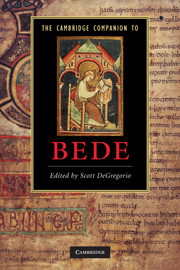Book contents
- Frontmatter
- Part I Bede’s Life and Context
- 1 Bede’s life in context
- 2 Secular and political contexts
- 3 The world of Latin learning
- 4 Church and monastery in Bede’s Northumbria
- 5 British and Irish contexts
- 6 The foundation of Bede’s Wearmouth-Jarrow
- Part II Bede's Writings
- Part III Reception and Influence
- Further reading
- Bibliography
- Index
2 - Secular and political contexts
from Part I - Bede’s Life and Context
Published online by Cambridge University Press: 28 January 2011
- Frontmatter
- Part I Bede’s Life and Context
- 1 Bede’s life in context
- 2 Secular and political contexts
- 3 The world of Latin learning
- 4 Church and monastery in Bede’s Northumbria
- 5 British and Irish contexts
- 6 The foundation of Bede’s Wearmouth-Jarrow
- Part II Bede's Writings
- Part III Reception and Influence
- Further reading
- Bibliography
- Index
Summary
The present chapter is not concerned with Bede's intellectual achievement, but, rather, with the political, social and economic circumstances of his life. Much of what we know of these circumstances comes from his own historical work. Bede's prose is lucid, and his style engaging. Such qualities have helped to secure a warm home for his Ecclesiastical History of the English People in the hearts of readers in every generation since his own. Early England and its Church are generally seen through Bede's eyes. Necessarily so: he is the chief source. But the simplicity and apparent candour of his style may deceive. In his historical work Bede deployed outstanding abilities to support strong convictions and homiletic intentions. With him, as with others like him, it is nearly as important to attend to what he does not say as to what he does. For example, mark that in the moving, almost elegiac, autobiographical passage in his Ecclesiastical History (V. 24) he fails to tell us who his father was. It is a fair guess (though unprovable) that his father was an aristocrat. Bede moved in the highest company. He sent a draft of his Ecclesiastical History to King Ceolwulf for comment. He was on visiting terms with Ceolwulf's cousin, Egbert, bishop (soon archbishop) of York; and it was to Egbert that he wrote the letter of detailed reformist rebuke which gives his harsh judgement on the Northumbrian Church. These relationships suggest that he was near to a circle of men in power.
- Type
- Chapter
- Information
- The Cambridge Companion to Bede , pp. 25 - 39Publisher: Cambridge University PressPrint publication year: 2010
- 4
- Cited by



